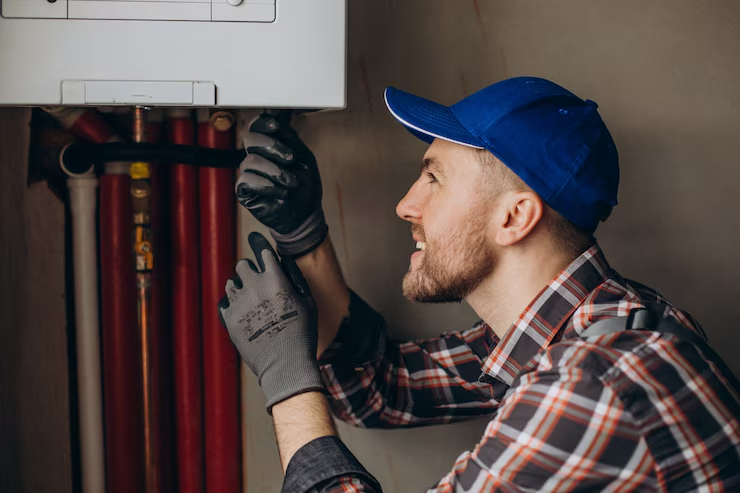Understanding the Costs of Boiler Installation
- Jayant Upadhyay
- May 7
- 7 min read
Updated: May 23

When it's time to install a new boiler, one of the first questions homeowners ask is, "How much is this going to cost?" The price of boiler installation can vary widely based on several factors, including the type of boiler, the complexity of the installation, and your location. Understanding these costs can help you budget effectively and choose the best option for your home. To navigate this important decision, let’s delve deeper into the various elements influencing boiler installation costs.
What Influences Boiler Installation Costs?

Several factors can affect the cost of installing a new boiler. Let's dive into the main considerations that you should be aware of before making your decision.
Type of Boiler
The type of boiler you choose is one of the most significant factors in determining installation costs. There are several types of boilers, each with its own cost implications and suitability for different household needs.
Combi Boilers: These are compact units that provide both heating and hot water without the need for a separate tank. They are typically more affordable to install due to their simplified design. Combi boilers are ideal for smaller homes or apartments where space is limited. Their installation is generally straightforward, which helps keep costs down.
System Boilers: System boilers require a hot water storage tank but no cold water tank, making them suitable for homes with more than one bathroom. This type of boiler is perfect for households with higher hot water demands. The additional hot water tank means that installation costs are slightly higher compared to combi boilers. However, they offer efficiency and reliability that can justify the price for larger homes.
Conventional Boilers: Also known as regular or traditional boilers, these require both a hot water tank and a cold water tank. They are more complex to install and may be costlier due to the additional components and space requirements. Conventional boilers are often found in older homes and may be necessary if your existing system is set up for this type. The installation complexity reflects in the price, but they provide robust heating solutions for large properties.
Complexity of Installation
The complexity of the installation can significantly impact the overall cost. Understanding the specifics of your installation situation will help you anticipate potential challenges and expenses.
Replacement vs. New Installation: If you are replacing an old boiler with a similar type in the same location, the installation is likely to be straightforward and less expensive. This is because existing pipework and connections can often be reused, reducing labor and material costs. On the other hand, new installations or changes in boiler type might require additional work.
Relocation of Boiler: Moving the boiler to a different part of the house or upgrading existing pipework can increase costs. This type of installation is more labor-intensive and may require additional materials, such as extended pipe runs or new venting systems. These factors contribute to higher installation expenses.
System Upgrades: Sometimes, the existing heating system needs upgrading to accommodate a new boiler. This might include improvements to radiators, pipework, or control systems, all of which add to the complexity and cost of installation. Upgrades can enhance system efficiency and reliability, so they are worth considering in the long term.
Location and Accessibility
Your geographic location also plays a role in the cost. Installation prices can vary depending on regional labor rates, and accessibility can further influence the final price.
Regional Labor Rates: Labor costs can vary significantly from one region to another. Areas with a higher cost of living typically have higher labor rates, which will affect the overall cost of your boiler installation. It's wise to get multiple quotes to understand the going rate in your area.
Access Challenges: If your home is difficult to access or the space for the boiler is hard to reach, these factors can add to the cost. Installers may need special equipment or additional labor to navigate tight spaces or challenging layouts, increasing installation expenses.
Local Regulations: Different regions may have specific regulations or codes that affect boiler installation. Compliance with these requirements might necessitate additional work or permits, which could influence the cost. Ensuring adherence to local codes is crucial for safety and legality.
Average Costs of Boiler Installation

To provide a clearer picture, let's look at some average costs for boiler installations. Keep in mind these are estimates and actual prices may vary based on numerous factors.
Combi Boiler Installation
Combi boilers are generally the most affordable option, both in terms of equipment and installation. On average, the cost of a combi boiler installation ranges from $2,500 to $4,000, including the unit and labor.
Initial Costs: The initial purchase and installation of a combi boiler are typically less expensive due to their all-in-one design and ease of installation. This makes them a popular choice for cost-conscious homeowners.
Efficiency and Savings: Despite the lower initial costs, combi boilers offer excellent efficiency, which can result in energy savings over time. Their ability to provide hot water on demand without a tank reduces waste and utility bills.
Space Considerations: Combi boilers are ideal for homes with limited space, as they do not require separate water tanks. This can save on installation costs related to space preparation or structural modifications.
System Boiler Installation
System boilers are slightly more expensive due to the need for a hot water storage tank. The average cost for system boiler installation ranges from $3,000 to $5,000.
Hot Water Demand: The inclusion of a hot water tank makes system boilers suitable for larger homes with multiple bathrooms. This additional capability justifies the higher installation cost.
Reliability and Performance: System boilers offer reliable performance and consistent hot water supply, which can be advantageous for families. The higher upfront investment is often offset by the comfort and convenience they provide.
Potential Upgrades: During installation, you may need to consider upgrades to existing systems, such as improving insulation or updating controls, to maximize efficiency. These upgrades can add to the cost but improve overall performance.
Conventional Boiler Installation
Conventional boilers are the most complex and therefore the most expensive to install. The average cost for installing a conventional boiler can range from $4,000 to $7,000 or more, depending on the additional work required.
Installation Complexity: The need for both hot and cold water tanks, along with additional pipework, makes conventional boiler installations more labor-intensive and costly. This complexity is reflected in the higher installation prices.
Suitability for Larger Homes: Conventional boilers are often the best choice for larger homes with existing systems designed for this type of boiler. They provide robust heating and hot water solutions, which can justify the higher costs.
Potential Structural Modifications: Installing a conventional boiler may require structural modifications to accommodate tanks and piping. These modifications can add to the overall cost but are necessary for optimal performance.
Additional Costs to Consider

While the boiler and installation are the primary costs, there are additional expenses that you might encounter. Being aware of these can help you budget more accurately.
Upgrades to Existing Systems
If your current heating system is outdated, you might need to upgrade pipework, radiators, or controls to accommodate the new boiler. These upgrades can add to the overall cost but can improve efficiency and performance.
Efficiency Improvements: Upgrading to newer, more efficient components can significantly enhance the overall performance of your heating system. While this can increase upfront costs, the long-term savings on energy bills can be substantial.
Compatibility Issues: New boilers may not be compatible with old systems, necessitating upgrades. Ensuring compatibility is crucial for optimal operation and to prevent issues down the line.
Enhanced Comfort: Investing in system upgrades can improve the distribution of heat throughout your home, enhancing comfort and reducing cold spots. This can be a worthwhile investment for your family's well-being.
Removal of Old Boiler
The removal and disposal of your old boiler might incur additional costs. Be sure to check whether this is included in the installation quote.
Environmental Considerations: Proper disposal of old boilers is essential for environmental compliance. Some installation services include this in their costs, while others charge extra, so it's important to clarify this beforehand.
Labor and Disposal Fees: Removing an old boiler involves labor and potential disposal fees. This process can be more complex if the old unit is located in a hard-to-reach area, impacting the cost.
Space Preparation: Removing the old boiler may also involve preparing the space for the new installation, such as cleaning or repairing the area. These tasks can add to the overall cost but are necessary for a smooth installation process.
Annual Maintenance and Repairs
After installation, regular maintenance is essential to ensure the efficient operation of your boiler and to extend its lifespan. This might include annual servicing and occasional repairs, which should be factored into your long-term budgeting.
Routine Servicing: Annual servicing helps keep your boiler running efficiently and can prevent costly breakdowns. Regular maintenance checks can identify potential issues early, saving money on major repairs.
Repair Costs: While newer boilers are generally reliable, occasional repairs might be needed as the system ages. Budgeting for these potential expenses can prevent financial surprises and ensure your boiler continues to operate effectively.
Extended Warranty Options: Consider investing in an extended warranty for your new boiler. This can cover the cost of repairs and servicing, offering peace of mind and protecting your investment.
How to Save on Boiler Installation Costs

While boiler installation can be a significant investment, there are ways to reduce costs without compromising on quality. Here are some strategies to help you save money on your new boiler installation.
Get Multiple Quotes: Always get quotes from several installers to compare prices and services. This ensures you get the best deal and helps you understand the market rate for installation in your area. When comparing quotes, consider not only the price but also the services included, such as warranties or maintenance packages.
Look for Discounts and Rebates: Some manufacturers or local utilities offer rebates for installing energy-efficient boilers. These incentives can significantly reduce your upfront costs. Research available programs and ask installers if they are aware of any current promotions or rebates.
Consider Long-term Savings: Investing in a more efficient boiler might cost more upfront, but it can lead to savings on energy bills over time. High-efficiency boilers can lower your heating costs, making them a cost-effective choice in the long run. Evaluate the potential savings on your energy bills and factor this into your decision-making process.
Seasonal Promotions: Consider timing your installation during off-peak seasons when demand for heating services is lower. Installers may offer discounts during these periods to attract business, potentially saving you money.
Bundled Services: Some companies offer bundled services, including installation, maintenance, and extended warranties. These packages can provide comprehensive coverage and savings over purchasing each service separately.
Conclusion
Understanding the costs associated with boiler installation can help you make an informed decision and prepare your budget. By considering the type of boiler, installation complexity, and location, you can better anticipate the overall expense. Remember to factor in additional costs and explore ways to save money on your investment.
Choosing the right boiler and installation service can not only provide comfort and warmth but also enhance the energy efficiency of your home. Make sure to consult with experienced professionals to get the best advice tailored to your needs. A well-planned boiler installation can lead to long-term savings, improved home comfort, and peace of mind knowing your heating system is reliable and efficient.



Comments